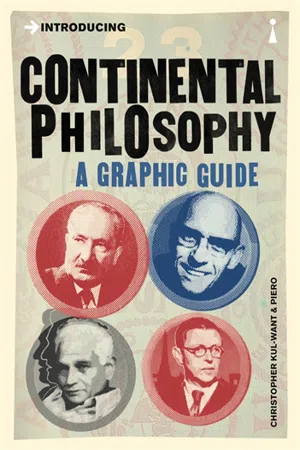
Introducing Continental Philosophy
A Graphic Guide
- 176 pages
- English
- ePUB (mobile friendly)
- Available on iOS & Android
About this book
What makes philosophy on the continent of Europe so different and exciting? And why does it have such a reputation for being 'difficult'?Continental philosophy was initiated amid the revolutionary ferment of the 18th century, philosophers such as Kant and Hegel confronting the extremism of the time with theories that challenged the very formation of individual and social consciousness.Covering the great philosophers of the modern and postmodern eras – from Nietzsche, Heidegger, Derrida and Deleuze right to up Agamben and?i?ek – and philosophical movements from German idealism to deconstruction and feminism – Christopher Kul-Want and Piero brilliantly elucidate some of the most thrilling and powerful ideas ever to have been discussed.
Tools to learn more effectively

Saving Books

Keyword Search

Annotating Text

Listen to it instead
Information
Index
Table of contents
- Cover
- Title Page
- Copyright
- Contents
- Thinking creatively
- What is Continental philosophy?
- A distinguished company
- Continental vs. Analytic philosophy
- The value of logic
- A shared history
- Against repression
- The limitations of theory
- Into the unknown
- Experience and the Self
- The search for structure
- Suspicion of universal truths
- The fantasy of consciousness
- The symbolic order
- The Trojan horse of communication
- The unconscious: a blind spot
- The universal medium of exchange
- “Incalculable relations”
- “They do not know it, but they are doing it”
- Kant and the unknowable
- Kant’s Copernican revolution
- The power of the new
- Alterity: the Other
- The sublime
- Nietzsche’s verdict: God is dead
- The death of metaphysics?
- Metaphysics and language
- A question of perspective
- The spectre of nihilism
- Absurd metaphysics
- Kant withdraws
- Metaphysics by the back door
- The colonial “Other”
- Re-thinking the unknown
- The will to power
- Love thy neighbour?
- The birth of the Overman
- Heidegger: the end of modernity?
- The threat of technology
- Hegel: history’s perfect conclusion
- Masters and slaves
- Being and Time
- The problem with modernity
- Dasein
- The limits of understanding
- Art as a sign of the end
- The puzzle of Communism’s failure
- The Frankfurt School
- Consumption as desire
- Oppositional art
- Walter Benjamin and “high Capitalism”
- Violence and the law
- Striking against Capitalist logic
- The power of montage
- Alienation visible
- The storm of progress
- Further influence of Nietzsche
- A philosophy of expenditure
- The plenitude of excess
- Fiction and reality in psychoanalysis
- “I myself do not exist …
- Sartre: Existentialism and authenticity
- Nausea: the chaos behind language
- Freedom of choice
- Fighting terror with commitment
- Existentialism and Marxism
- 1968: the watershed
- Refusing fixed meaning
- Collapse of the ideologies
- Evental occurrences
- The “trace” of Communism
- Lyotard: the question of knowledge
- Information overload
- The limits of the mind
- Rancière and the unheard voice
- Derrida: the metaphysics of presence
- Saussure’s limitless meanings
- Deconstruction
- Derrida the juggler
- “Peut-être”
- Thinking about friendship
- Back to Nietzsche
- Phallo-logocentrism
- Woman cannot lack
- Jouissance
- A void in representation
- The subject as producer
- The private and the political
- Producing producers
- Biopolitics: multiple forces of power
- Monitoring for normality
- The terrorist state
- Separating violence and the law
- The power of language
- “As if not”
- Neither in heaven nor in hell
- “I would prefer not to”
- The black hole of the bourgeoisie
- The alterity of death
- Language at degree zero
- Deleuze: “schizoanalysis”
- Anti-Oedipus
- The Metamorphosis: schizophrenic desire
- The body without organs
- Pure immanence
- Casting off the shackles
- Glossary
- Further Reading
- About the Author
- Acknowledgements
- About the Illustrator
- Index
Frequently asked questions
- Essential is ideal for learners and professionals who enjoy exploring a wide range of subjects. Access the Essential Library with 800,000+ trusted titles and best-sellers across business, personal growth, and the humanities. Includes unlimited reading time and Standard Read Aloud voice.
- Complete: Perfect for advanced learners and researchers needing full, unrestricted access. Unlock 1.4M+ books across hundreds of subjects, including academic and specialized titles. The Complete Plan also includes advanced features like Premium Read Aloud and Research Assistant.
Please note we cannot support devices running on iOS 13 and Android 7 or earlier. Learn more about using the app